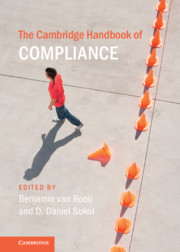Book contents
- The Cambridge Handbook of Compliance
- The Cambridge Handbook of Compliance
- Copyright page
- Contents
- Figures
- Tables
- Contributors
- 1 Introduction: Compliance as the Interaction between Rules and Behavior
- Part I Compliance Concepts and Approaches
- 2 Compliance as Costs and Benefits
- 3 The Professionalization of Compliance
- 4 From Responsive Regulation to Ecological Compliance: Meta-regulation and the Existential Challenge of Corporate Compliance
- 5 Behavioral Ethics as Compliance
- 6 Constructing the Content and Meaning of Law and Compliance
- 7 Compliance as Operations Management
- 8 Compliance and Contestation
- 9 Compliance as Management
- 10 Compliance as Liability Risk Management
- 11 Criminalized Compliance
- 12 Supply Chain Compliance
- 13 Regulatory Compliance in a Global Perspective: Developing Countries, Emerging Markets and the Role of International Development Institutions
- Part II Deterrence and Incapacitation
- Part III Incentives
- Part IV Legitimacy and Social Norms
- Part V Capacity and Opportunity
- Part VI Compliance and Cognition
- Part VII Management and Organizational Processes
- Part VIII Measuring and Evaluating Compliance
- Part IX Analysis of Particular Fields
11 - Criminalized Compliance
from Part I - Compliance Concepts and Approaches
Published online by Cambridge University Press: 07 May 2021
- The Cambridge Handbook of Compliance
- The Cambridge Handbook of Compliance
- Copyright page
- Contents
- Figures
- Tables
- Contributors
- 1 Introduction: Compliance as the Interaction between Rules and Behavior
- Part I Compliance Concepts and Approaches
- 2 Compliance as Costs and Benefits
- 3 The Professionalization of Compliance
- 4 From Responsive Regulation to Ecological Compliance: Meta-regulation and the Existential Challenge of Corporate Compliance
- 5 Behavioral Ethics as Compliance
- 6 Constructing the Content and Meaning of Law and Compliance
- 7 Compliance as Operations Management
- 8 Compliance and Contestation
- 9 Compliance as Management
- 10 Compliance as Liability Risk Management
- 11 Criminalized Compliance
- 12 Supply Chain Compliance
- 13 Regulatory Compliance in a Global Perspective: Developing Countries, Emerging Markets and the Role of International Development Institutions
- Part II Deterrence and Incapacitation
- Part III Incentives
- Part IV Legitimacy and Social Norms
- Part V Capacity and Opportunity
- Part VI Compliance and Cognition
- Part VII Management and Organizational Processes
- Part VIII Measuring and Evaluating Compliance
- Part IX Analysis of Particular Fields
Summary
Abstract: Corporate compliance programs have become increasingly criminalized. In the truest of ironies, companies have adopted compliance protocols that are motivated by and mimic application of the law they seek to avoid most. This approach to compliance – using the precepts of criminal enforcement and adjudication to govern employee conduct – is inherently flawed, however, and can never be fully effective in abating corporate wrongdoing. Criminalized compliance programs impose unintended behavioral consequences on employees, specifically by fostering rationalizations that allow would-be offenders to square their self-perception as “good people” with the unethical or illegal behavior they are contemplating, thereby allowing wrongdoing to go forward. By importing into the corporation many of the criminal law’s delegitimizing features, criminalized compliance encourages rationalizations and creates the necessary precursors to the commission of corporate crime. Once this dynamic is understood, it provides a new way of conceptualizing corporate compliance and explains the ineffectiveness of many “leading” compliance programs. It also suggests that companies committed to making gains in ethics and compliance should often ignore the practices of their peers and the regulators that influence them, and instead design behaviorally cognizant strategies aimed at combating individual and organizational rationalizations.
- Type
- Chapter
- Information
- The Cambridge Handbook of Compliance , pp. 133 - 144Publisher: Cambridge University PressPrint publication year: 2021
- 1
- Cited by



